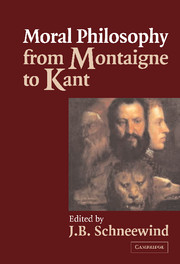Book contents
- Frontmatter
- Contents
- Preface
- Acknowledgments
- Foreword to the One-Volume Reprint
- Introduction
- PROLEGOMENA: SOME QUESTIONS RAISED
- PART I REWORKING NATURAL LAW
- PART II INTELLECT AND MORALITY
- PART III EPICUREANS AND EGOISTS
- PART IV AUTONOMY AND RESPONSIBILITY
- The Earl of Shaftesbury
- Francis Hutcheson
- Joseph Butler
- David Hume
- Christian August Crusius
- Richard Price
- Jean-Jacques Rousseau
- Thomas Reid
- Immanuel Kant
- Supplemental Bibliography
Thomas Reid
Published online by Cambridge University Press: 05 June 2012
- Frontmatter
- Contents
- Preface
- Acknowledgments
- Foreword to the One-Volume Reprint
- Introduction
- PROLEGOMENA: SOME QUESTIONS RAISED
- PART I REWORKING NATURAL LAW
- PART II INTELLECT AND MORALITY
- PART III EPICUREANS AND EGOISTS
- PART IV AUTONOMY AND RESPONSIBILITY
- The Earl of Shaftesbury
- Francis Hutcheson
- Joseph Butler
- David Hume
- Christian August Crusius
- Richard Price
- Jean-Jacques Rousseau
- Thomas Reid
- Immanuel Kant
- Supplemental Bibliography
Summary
Introduction
Reid was one of the creators of the Scottish Enlightenment. Born in 1710, he was a younger contemporary of Hutcheson's, a year older than Hume and a dozen years older than Adam Smith, but he outlived them all. We are apt to forget his close intellectual and personal connections with many of these figures, because he published his major works very late in his life. Reid studied in Aberdeen, was ordained in the Presbyterian church in 1731, and from 1737 until 1751 served as parish minister in the small town of New Machar. Thereafter he was a university professor, first at King's College, Aberdeen, and from 1764 on at Glasgow. His Inquiry into the Human Mind on the Principles of Common Sense (1764) is an epistemological study, directed against Hume, of the nature of sensation and its role in our perception of the external world. Throughout his career Reid was actively involved in various societies of intellectuals and literary men trying to cope with Scotland's economic and social problems. An effective and conscientious teacher, he published after his retirement in 1780 much of the material from one course that he regularly gave as Essays on the Intellectual Powers of Man in 1785 and material from another as Essays on the Active Powers of the Human Mind in 1788. He died in 1796.
Unlike any of the other philosophers of the Scottish Enlightenment, Reid became the founder of a school.
- Type
- Chapter
- Information
- Moral Philosophy from Montaigne to Kant , pp. 630 - 650Publisher: Cambridge University PressPrint publication year: 2002



